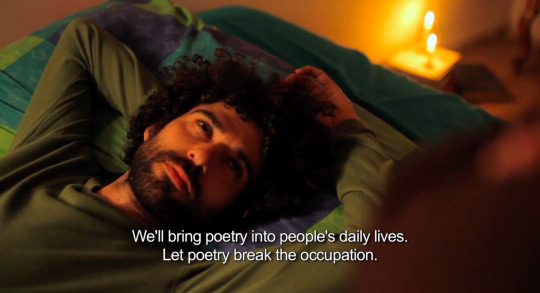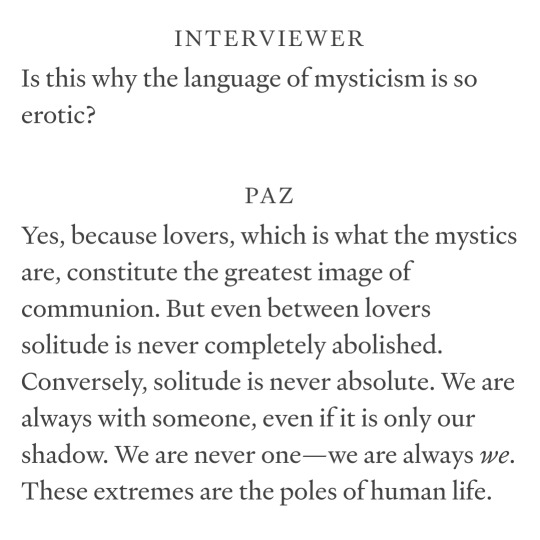Text
The Christian faith relates to suffering not merely as remover or consoler. It offers no 'supernatural remedy for suffering' but strives for a 'supernatural use for it.' A person's wounds are not taken from him. Even the risen Christ still had his scars.
Dorothee Soelle, Suffering, p. 155
50 notes
·
View notes
Text

Fyodor Dostoevsky, tr. by Hugh Aplin, from "Poor People," originally written in 1846
5K notes
·
View notes
Text


"stress" by yoan capote - made of bronze and concrete
143K notes
·
View notes
Photo

LEONOR FINI & SYLVIA PLATH
Los durmientes
La calle en la que se hallan estos dos Durmientes no figura en ningún mapa. Hemos perdido su rastro. Yacen Como sumergidos en el agua, Bajo una luz azul e inmutable, La puertaventana entreabierta, Con una cortina de encaje amarilla, A través de la estrecha abertura Ascienden los olores de la tierra mojada. El caracol deja una estela plateada; Oscuros matorrales cercan la casa. Volvemos la vista atrás. Entre los pétalos pálidos como la muerte Y las hojas de forma constante, ellos Siguen durmiendo, boca a boca. La niebla empieza a condensarse. Sus pequeñas, verdes fosas nasales vibran, Mientras ellos se entregan a su sueño. Expulsados de ese cálido lecho, Nosotros somos lo que ellos sueñan. Sus párpados retienen la oscuridad. Los durmientes no pueden sufrir Ningún daño. Nosotros nos arrancamos La piel y nos internamos en otro tiempo. - Sylvia Plath, en Poesía Completa, Edición de Ted Hughes. Traducción de Xoán Abeleira. Bartleby Editores – Edición bilingüe – 2009
- Leonor Fini, Monsieur Venus: Tendresse, c 1980. Aguafuerte 29,1 x 20,1 cm
53 notes
·
View notes
Text





Habibi (2011) dir. Susan Youssef
Habibi, a story of forbidden love, is a fiction feature set in Gaza. Two students in the West Bank are forced to return home to Gaza, where their love defies tradition. To reach his lover, Qays grafittis poetry across town. Habibi is a modern re-telling of the famous ancient Sufi parable Majnun Layla. The full Arabic title is ‘Habibi Rasak Kharban,’ which translates as “Darling, something’s wrong with your head.” — from the Palestine Film Institute
12K notes
·
View notes
Text

Mahmoud Darwish, Journal of an Ordinary Grief (يـومـيـات الـحـزن الـعـادي), 1973
35K notes
·
View notes
Text
You won’t become prettier after you lose weight because you always were. You won’t be greater when you write the perfect thesis and graduate. You don’t need to prove to anyone that you deserve space in this world. You were born in this place so now all you have to do is live. You don’t need to achieve a certain goal that makes you sabotage your social or professional life in order to get where you want to be.
579 notes
·
View notes
Text
…when I did feel I had to tell Mama my song, she listened, but it was the quiet kind of listening one has when they already know, or maybe just when it's a song they've sung themselves, but with different lyrics.
– Gayl Jones, Corregidora
10 notes
·
View notes
Quote
Nothing is ever as beautiful as the first isolated moments with someone who might be able to love you — with someone you yourself might be able to love. There is nothing as silent as these minutes, nothing so saturated with sweet anticipation. It is for these few minutes that we love, not for the many that follow. Never again, they realize, would anything so beautiful ever happen to them. They might be happier, more impassioned, too, and infinitely satiated with their own bodies and with each other’s. But never again would it be so beautiful.
Stig Dagerman, A Moth to a Flame (Burnt Child) (trans. Benjamin Mier-Cruz)
8K notes
·
View notes
Text
The appetisers were delicious, not because of the kitchen, but because all food eaten in anticipation of a kiss is delicious.
-Maggie Stiefvater, The Dream Thieves
434 notes
·
View notes
Photo

Octavio Paz, The Art of Poetry No. 42 (interviewed by Alfred Mac Adam)
[Text ID: “INTERVIEWER: Is this why the language of mysticism is so erotic?
PAZ: Yes, because lovers, which is what the mystics are, constitute the greatest image of communion. But even between lovers solitude is never completely abolished. Conversely, solitude is never absolute. We are always with someone, even if it is only our shadow. We are never one—we are always we. These extremes are the poles of human life.”]
2K notes
·
View notes
Text

Karl Bryullov (1799-1852) “A Dream of a Girl Before a Sunrise” (1830-1833) Watercolor Romanticism Located in the Pushkin Museum, Moscow, Russia
253 notes
·
View notes
Photo

Anne Carson, from “The Glass Essay”, Glass, Irony, and God
7K notes
·
View notes








